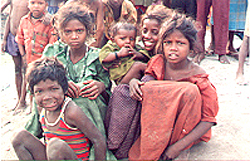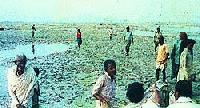News
NGO Networks for Health
 NGO Networks for Health
NGO Networks for Health
(Networks) is an innovative
five-year global health project created to meet the
burgeoning need for family planning, reproductive
health, child survival, and HIV/AIDs (FP/RH/CS/HIV)
information and services in developing countries.
Aware that new forms of cooperation are called for if
communities are to meet these challenges, five PVO
Partners-ADRA, CARE, PATH, Plan International,
and Save the Children-are collaborating to implement
the Networks project. Networks' vision is to empower
and enable individuals, families, and communities to
improve their health. Networks pursues its vision by creating innovative and enduring
NGO partnerships and fostering and supporting networks that enhance the scale
and quality of FP/RH/CS/HIV programs. Networks has begun project activities in
Armenia, Malawi, and Nicaragua with more countries to follow. Image:NGO networks
|
Bihar comprises of 38 poorest districts
 According to the Ministry of Rural
Development, Bihar is at the top most
position in the list of having poorest
and backward districts. The no. of
poor and backward districts in Bihar is
the highest i.e., 38.
According to the Ministry of Rural
Development, Bihar is at the top most
position in the list of having poorest
and backward districts. The no. of
poor and backward districts in Bihar is
the highest i.e., 38.
In all 100 districts coming under this
category, Bihar takes its share as high
as 38 while next comes Madhya Pradesh with 19 and is followed by Uttar
Pradesh with 17 such districts. Maharashtra accounts for as many as 10
while West Bengal and Orissa have four districts each; Rajasthan and
Sikkim have two districts; Haryana, Karnataka, Himachal Pradesh and
Dadra and Nagar Haveli have one district each. Incidentally, Tamil Nadu,
Andhra Pradesh and the northeastern States do not figure in this list
implying that by the yardstick applied by the Ministry, these States do not
have any poor and backward district.
Central Board of Direct Taxes has also drawn a list, which provide the
number of both poor and industrially backward districts. Here again Bihar
tops the list so far as poor districts are concerned with 20 and Uttar
Pradesh qualifies for the same position in the industrially backward
category with 24 districts. Bihar has 13 industrially backward districts and
so has Madhya Pradesh.
Backward districts of Bihar are Nalanda, Bhojpur, Ranchi, Aurangabad,
Jehanabad, Gaya, Nawada, Saran, Gopalgunj, W. Champaran, E.
Champaran, Sitamarhi, Muzaffarpur, Vaishali, Begusarai, Samastipur,
Darbhanga, Madhubani, Madhepura, Purnia, Katihar, Khagaria, Munger,
Bhagalpur, Godda, Sahebgunj, Dumka, Deoghar, Giridih, Hazaribag,
Palamu, Lohardaga, Gumla, W. Singhbhum, Araria, Kishangunj.
|
Educational tools for combatting micronutrient malnutrition
After graduating from medical school, a young doctor in India begins his practice in
Bihar district, one of India's poorest regions. On his first day at the clinic, a mother
brings in her five-year-old son, who has had a fever, a cough, and no appetite for four
days. It turns out the boy has an inflamed ear drum and throat, and a swelling in the
neck. The ear and throat inflammation are symptoms of an ear infection, but the
neck swelling indicates something more serious — a goitre caused by iodine
deficiency. This fictional scenario, based upon real clinical experience, was created
as part of an international project that aims to produce computer-assisted
educational programs on micronutrient malnutrition . The main participants are
researchers at McMaster University in Hamilton, Ontario, and the Micronutrient
Initiative, an international secretariat housed at the Ottawa headquarters of the
International Development Research Centre (IDRC).
|
The Koshi untamed
 The floods-prone Kosi is 'Bihar's sorrow' , a
nightmare in flood management. Efforts to
contain the river's annual season of fury by
building embankments have not succeeded.
A trip along the Kosi, in the
thickly-populated and desperately poor
northern Bihar, that revealed tales of woe.
|
Civil society forum on the Global Development Gateway
 GDG Principles is a public electronic forum to discuss civil society
responses to the proposed Global Development Gateway (GDG), which is a major
World Bank-led initiative to create "a portal website on development issues from
which users will be able to access information, resources, and tools, and into which
they will be able to contribute their own knowledge and experience. Several civil
society organizations, (Oneworld International, the Institute for Development Studies
at the University of Sussex, Transparency International, Bellanet and others) have
met among themselves and with World Bank staff to discuss their role in the
Gateway and its potential to shape information exchange among development
partners worldwide. The results of these initial discussions are posted on the GDG
Principles site, including a proposal for civil society representation in the evolution of
the Gateway, Interim Civil Society Steering Committee for the GDG. Civil society
will have a large part to play in ensuring that the Gateway realizes its goal of
enabling "those in the development field to share information, easily communicate,
and build communities of practice around significant development challenges from
the grassroots up." Civil society partners wish to ensure that the initiative reflects
the diversity of development perspectives and approaches, that it meets the needs
of all stakeholders in development, and that it complements and strengthens
existing networks for information sharing and dialogue. GDG Principles is a forum
for transparent and constructive discussion of the GDG.Image:Bellanet

Back
| |



